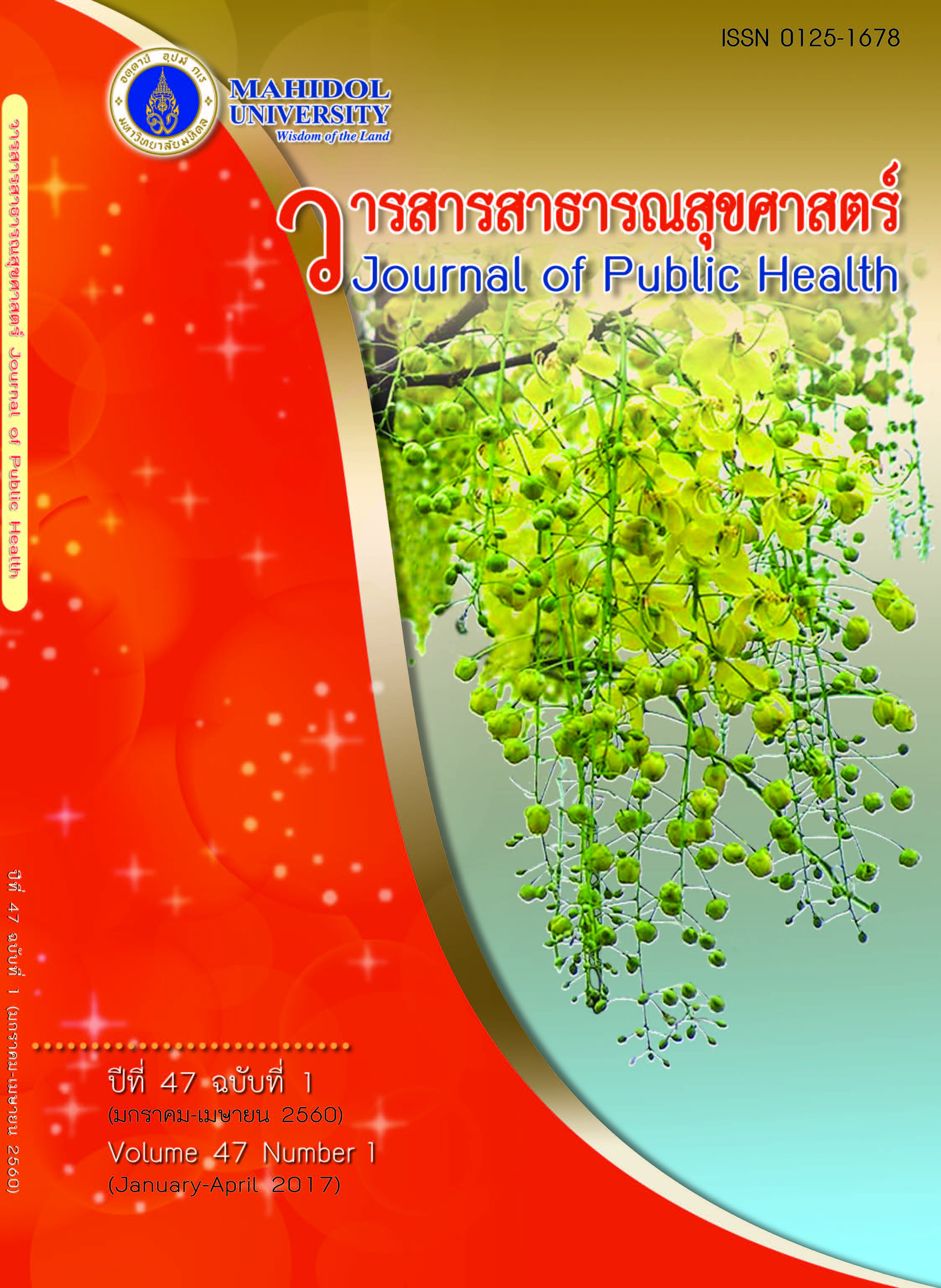Effects of a Supportive Educative Nursing Program on Knowledge and Self-care Behaviors of Older Adults with Heart Failure
Keywords:
supportive educative nursing program, older adults, self-care behavior, heart failure, โปรแกรมการสนับสนุนและให้ความรู้, ผู้สูงอายุ, พฤติกรรมการดูแลตนเอง, โรคหัวใจวายAbstract
An increasing number of older adults with heart failure has been recognized worldwide. With a decline in self-care ability and lack of knowledge, older patients with heart failure have been facing frequent admission and more complications. The aim of this study was to assess the effects of a supportive educative nursing program developed based on the Orem’s Self-care Theory on knowledge and self-care behaviors of the older patients with heart failure. A two-group pre-posttest experimental study was conducted at patients’ homes in Bangkok. A total of 42 participants, 60 years and older with a diagnosis of heart failure, were randomly assigned to the intervention and the comparison groups. The comparison group received routine care, while the intervention group received a 4-week supportive educative nursing program. The intervention consisted of health education and skill training on fluid and sodium restriction, medical adherence, exercise, and emergency care, home visits; and weekly telephone call. A self-report questionnaire, developed by the researcher, was used to collect data before and after the intervention. According to paired t-test, the intervention group has a significantly higher pre-posttest mean score of knowledge as well as self-care behaviors (p<0.001). The results confirmed that a supportive educative nursing program could improve knowledge and self-care behaviors of older adults with HF. Clinical outcome should be examined for older adults with HF in the future study. This program should be applied to promote self-care behaviors of the community-dwelling older patients with other chronic disease.
ผลของโปรแกรมการสนับสนุนและให้ความรู้ต่อความรู้และพฤติกรรมการดูแลตนเองของผู้ป่วยสูงอายุที่มีภาวะหัวใจล้มเหลว
ปัจจุบันจำนวนผู้สูงอายุที่มีภาวะหัวใจล้มเหลวมีจำนวนเพิ่มขึ้นทั่วโลก พบว่า ผู้สูงอายุดังกล่าวต้องเผชิญกับปัญหาการเข้ารักษาตัวในโรงพยาบาลและภาวะแทรกซ้อนบ่อยครั้ง เนื่องจากมีความสามารถในการดูแลตนเองลดลง และขาดความรู้เรื่องโรคและการดูแลตนเอง การวิจัยนี้มีวัตถุประสงค์เพื่อศึกษาผลของโปรแกรมการสนับสนุนและให้ความรู้ต่อความรู้และพฤติกรรมการดูแลตนเองของผู้ป่วยสูงอายุที่มีภาวะหัวใจล้มเหลวหลังจากจำหน่ายออกจากโรงพยาบาล การวิจัยกึ่งทดลองแบบ 2 กลุ่ม วัดก่อนและหลัง ทำการศึกษาในกลุ่มผู้ป่วยที่มีภาวะหัวใจล้มเหลว อายุ 60 ปีขึ้นไป ที่จำหน่ายออกจากโรงพยาบาลกลาง กรุงเทพมหานคร สุ่มเลือกกลุ่มเปรียบเทียบ (ได้รับการดูแลตามปกติ) และกลุ่มทดลอง (ได้รับโปรแกรมการสนับสนุนและให้ความรู้ เป็นระยะเวลา 4 สัปดาห์) ประกอบด้วยการสอนให้ความรู้ การเยี่ยมบ้าน และการโทรศัพท์ติดตามสัปดาห์ละ 1 ครั้ง เก็บข้อมูลโดยใช้แบบสอบถามความรู้และแบบสอบถามพฤติกรรมการดูแลตนเองที่พัฒนาโดยผู้วิจัย ผลการวิเคราะห์ด้วยสถิติ Paired t-test พบว่า กลุ่มทดลองมีความรู้และพฤติกรรมการดูแลตนเอง มากกว่าก่อนได้รับโปรแกรมอย่างมีนัยสำคัญทางสถิติ (p< 0.001) พบว่า โปรแกรมการสนับสนุนและให้ความรู้สามารถพัฒนาความรู้และส่งเสริมพฤติกรรมการดูแลตนเองของผู้ป่วยภาวะหัวใจล้มเหลวได้ จึงควรนำโปรแกรมดังกล่าวไปใช้เป็นแนวทางในการดูแลผู้ป่วยภาวะหัวใจล้มเหลวในชุมชนเพื่อพัฒนาผลลัพธ์ทางสุขภาพต่อไป
Downloads
Published
Issue
Section
License
Creative Commons License CC-BY-ND


